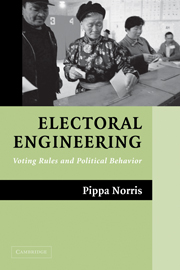Book contents
- Frontmatter
- Contents
- List of Tables and Figures
- Preface
- Electoral Engineering
- PART I INTRODUCTION
- 1 Do Rules Matter? Structure versus Culture
- 2 Classifying Electoral Systems
- 3 Evaluating Electoral Systems
- PART II THE CONSEQUENCES FOR VOTING BEHAVIOR
- PART III THE CONSEQUENCES FOR POLITICAL REPRESENTATION
- PART IV CONCLUSIONS
- Bibliography
- Notes
- Index
1 - Do Rules Matter? Structure versus Culture
Published online by Cambridge University Press: 05 September 2012
- Frontmatter
- Contents
- List of Tables and Figures
- Preface
- Electoral Engineering
- PART I INTRODUCTION
- 1 Do Rules Matter? Structure versus Culture
- 2 Classifying Electoral Systems
- 3 Evaluating Electoral Systems
- PART II THE CONSEQUENCES FOR VOTING BEHAVIOR
- PART III THE CONSEQUENCES FOR POLITICAL REPRESENTATION
- PART IV CONCLUSIONS
- Bibliography
- Notes
- Index
Summary
From Kosovo to Kabul, the last decade has witnessed growing interest in “electoral engineering.” The end of the Cold War, the global spread of democracy, and new thinking about development spurred this process. During the late 1980s and early 1990s the flowering of transitional and consolidating “third wave” democracies around the globe generated a wave of institution building. International agencies such as the World Bank came to understand that good governance was not a luxury that could be delayed while more basic social needs were being met, like the provision of clean water, basic health care, and schooling. Instead the establishment of democracy was understood as an essential pre-condition for effective human development and management of poverty, inequality, and ethnic conflict. The donor community recognized that the downfall of many corrupt dictatorships in Latin America, Central Europe, Asia, and Africa created new opportunities for political development. Subsequent histories show that the process of deepening democracy and good governance has proved to be fraught with many difficulties, with little change to many repressive regimes in the Middle East, only fragile and unstable consolidation in Argentina and Venezuela, and even occasional reversions back to authoritarian rule, exemplified by Zimbabwe and Pakistan.
International agencies have used a triple strategy to promote democracy. Institution building has been one priority, by strengthening independent judiciaries and effective legislatures designed to curb and counterbalance executive powers. Civic society has been another priority, with attempts to nurture grassroots organizations, advocacy nongovernmental organizations (NGOs), and independent media.
- Type
- Chapter
- Information
- Electoral EngineeringVoting Rules and Political Behavior, pp. 3 - 38Publisher: Cambridge University PressPrint publication year: 2004

